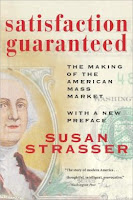Satisfaction Guaranteed: the Making of the American Mass Market
© 2004 Susan Strasser
348 pages
America was born of the frontier, its citizens people who by necessity often manufactured their own household requirements. This was the case throughout most of the 19th century: even in cities where people could purchase articles like candles and clothing. But by that century’s end, a revolution was in the process – a consumer revolution in which virtually every household good, from food to cleaning solutions, came from factories. Even more remarkably, however, those goods weren’t even coming from the factories through familiar faces at local groceries: they were entering the lives of people through new mail-order schemes and colossal supermarkets. Satisfaction Guaranteed examines how a few entrepreneurs transformed Americans’ lifestyles and marketplace.
Like Never Done and Waste and Want, Satisfaction is chiefly focused on social history, and together the three examine various facets of Americans’ transformation from producers to consumers, of how a nation of nominally self-reliant farmers and merchants became one of employee-consumers and big business. Unlike her previous workers, however, here Strasser presents a critical business history, rather like Straight Out of the Oven or Cheap. To explain the success of the new businesses, she demonstrates to readers how they created completely new business and marketing practices, like ‘market segmentation’ – targeting particular products within a brand to specific demographics. Another novelty was that of the brand name or trademark, which could be used to build a reputation for quality. They also depended on new technologies and systems, either material (in the form of railroads that allowed for mail-order companies to flower and deliver cheaper goods through volume sales) or legal, like court decisions that made corporations easier to form and much more effective at managing interstate businesses. Strasser places the most emphasis on marketing, however, for it was marketing that introduced Americans to completely new goods (‘Oleomargarine? What kinda cow makes that?), marketing that coaxed them into trying it even when their local grocers didn’t want to stock it, and marketing that gradually lured them into not only using products, but becoming dependent on them. Marketing is why invention is the mother of necessity.
Although Strasser regards consumerism as wasteful, she doesn’t rail against the giants that promote it – indeed, depend on it. There are no villains in this piece, though she’s plainly sympathetic to the small businessmen, like the neighborhood grocers and general store managers, who were at first forced to keep goods on their shelves they had no experience with , and then driven out of business when large chains like A&P Groceries invaded. (Ads of the day directed potentials customers that if their local firms didn’t carry Crisco or the brand in question, they should forward the names and addresses of those firms to the corporation, who would see to it that the goods were offered for retail.) The new branded products didn’t offer storekeepers much of a profit margin, and eventually corporations began seeing local retailers as obstacles to reaching as broad a customer base as they possibly could – and that was the goal: not meeting needs, but devising any way to create and capture new markets. Whereas once Americans produced things in-house to satisfy their needs, now they were consumers who bought whatever ensnared their interests – and following the ‘credit revolution’, they didn’t even need to be limited by what they could afford.
Strasser’s previous work has been lively yet comprehensive, and Satisfaction Guaranteed largely meets those standards. Covering the intersection of business practices and lifestyle, she focuses more on new approaches business management than on lifestyle, the usual center of attention, which may broaden her audience to those interested in business in general. This by no means detracts from its appeal as an introduction to the origins of mass consumerism in America, however.

No comments:
Post a Comment
Thank you for visiting! Because of some very clever spambots, I've had to start moderating comments more strictly, but they're approved throughout the day.